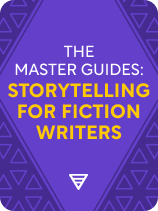

This article is an excerpt from the Shortform book guide to "The Master Guides: Storytelling for Fiction Writers" by Shortform. Shortform has the world's best summaries and analyses of books you should be reading.
Like this article? Sign up for a free trial here.
How can your story’s theme inspire you as you write? At what point in the writing process should you select a theme?
A good story is more than just a series of events. A story should be about something, and you develop that element as the story unfolds. We’ve put together several insights and pieces of advice from story-writing experts Stephen King, Rob Biesenbach, Lisa Cron, Joseph Campbell, and Robert McKee.
Read more to learn how to write the theme of a story in a way that inspires you as well as your readers.
How to Write the Theme of a Story
Storywriting experts agree that a good story transcends its particular details to convey a larger message or theme. This is the message you’re sending or the question you’re answering. In his book On Writing, Stephen King believes that all good writing has a theme. Themes focus the story, making it feel more unified and coherent. A theme is also inspiring to the writer—it makes the work feel meaningful and worthwhile.
King has some advice on how to write the theme of a story that might surprise you. He contends that the theme shouldn’t be premeditated. He recommends that you start with the story and discover the theme as you go along. Forcing your story to adhere to a certain theme as you write will make it feel artificial and less true to life. Themes often come from your personal interests—what you like musing about. King has his own, which become recurring themes in his works: the allure of technology and its inevitable problems (The Stand, The Tommyknockers), why bad things happen to good people (The Shining, The Dark Half), and the blurring of reality and fantasy (Bag of Bones, The Dark Half).
Hopefully, the themes you’re personally interested in will also be interesting to others. According to Rob Biesenbach in his book Unleash the Power of Storytelling, the most effective themes involve values you share with your audience. For example, a story about how a neighborhood banded together to replant a vegetable garden that was washed out in a storm will appeal to an audience that values collaboration, resilience, and mutual aid.
Theme Manifests Through Internal Change
Some experts note that a story’s theme is often conveyed through internal change. In Wired for Story, Lisa Cron contends that any story is truly about how the protagonist changes as a result of the story’s events. She adds that the plot is the external events of the narrative, while the story is about the protagonist’s internal reactions.
The most meaningful stories in history all revolve around a protagonist’s internal change, according to mythology expert Joseph Campbell. In The Hero With a Thousand Faces, Campbell asserts that cultures around the world all draw on the same essential mythological template: the hero’s journey. The hero’s journey is all about transformation—the hero goes on a quest and returns having changed.
Additionally, for a change in your protagonist’s life to be meaningful, Robert McKee argues in his book Story that the change must occur because of your protagonist’s actions. A few random events that change your character’s life are fine to include in your story, but they don’t create meaning on their own. To communicate the kind of meaning that resonates with the audience on an intellectual and emotional level, show the cause and effect of your protagonist’s choices.

———End of Preview———
Like what you just read? Read the rest of the world's best book summary and analysis of Shortform's "The Master Guides: Storytelling for Fiction Writers" at Shortform.
Here's what you'll find in our full The Master Guides: Storytelling for Fiction Writers summary:
- How to capture and communicate emotional magic through fiction
- Advice from successful authors and storytelling experts
- The five steps of writing a story, from ideating to publishing






